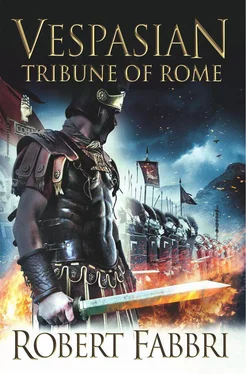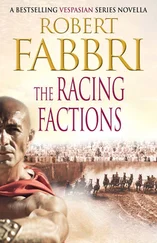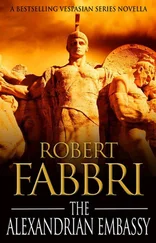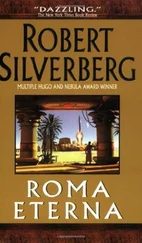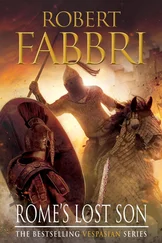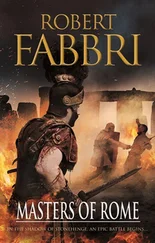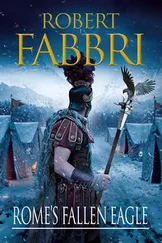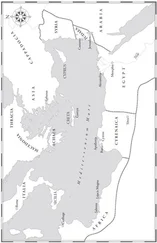Robert Fabbri - Tribune of Rome
Здесь есть возможность читать онлайн «Robert Fabbri - Tribune of Rome» весь текст электронной книги совершенно бесплатно (целиком полную версию без сокращений). В некоторых случаях можно слушать аудио, скачать через торрент в формате fb2 и присутствует краткое содержание. Жанр: Исторические приключения, на английском языке. Описание произведения, (предисловие) а так же отзывы посетителей доступны на портале библиотеки ЛибКат.
- Название:Tribune of Rome
- Автор:
- Жанр:
- Год:неизвестен
- ISBN:нет данных
- Рейтинг книги:3 / 5. Голосов: 1
-
Избранное:Добавить в избранное
- Отзывы:
-
Ваша оценка:
- 60
- 1
- 2
- 3
- 4
- 5
Tribune of Rome: краткое содержание, описание и аннотация
Предлагаем к чтению аннотацию, описание, краткое содержание или предисловие (зависит от того, что написал сам автор книги «Tribune of Rome»). Если вы не нашли необходимую информацию о книге — напишите в комментариях, мы постараемся отыскать её.
Tribune of Rome — читать онлайн бесплатно полную книгу (весь текст) целиком
Ниже представлен текст книги, разбитый по страницам. Система сохранения места последней прочитанной страницы, позволяет с удобством читать онлайн бесплатно книгу «Tribune of Rome», без необходимости каждый раз заново искать на чём Вы остановились. Поставьте закладку, и сможете в любой момент перейти на страницу, на которой закончили чтение.
Интервал:
Закладка:
As the small party drew closer to their destination Vespasian contemplated how he would advance himself in this highly competitive society that he was being forced into, where the only permanent loyalties were to Rome, one’s family and one’s personal honour and dignity. He looked up at the brown cloud in the distance as his horse pressed on up a hill and wondered whether he would be suited to, or even wanted, such a competitive life. The road ignored the steep incline as it forged ahead and before he had arrived at any firm conclusion it reached the summit.
Vespasian stopped and gasped. Forgetting all else he stared in disbelief at the most magnificent sight that he had ever seen. Five or so miles before him, crowned with a thick brown halo formed from the smoke of half a million cooking fires and the discharge of countless forges and tanneries, its seven hills encircled by huge red-brick walls punctuated by mighty towers, stood the heart of the most powerful empire in the world: Rome.
‘I remember stopping and marvelling in this very place forty years ago when my mother brought me here at your age,’ Titus said, pulling up next to him. ‘When a man sees Rome for the first time and feels her power and his own insignificance in the face of it, he realises that he has but two choices: serve her or perish under her, for there is no ignoring her.’
Vespasian looked at his father. ‘In that case there is no choice,’ he said in a quiet voice. Titus smiled and stroked the smooth neck of his mount whilst he contemplated the scale of the city below them.
‘If that sight overwhelms us so, imagine how some hairy-arsed barbarian from the forests of Germania or Gaul must feel when faced with such might. Is it any wonder that their chieftains are now falling over themselves to become citizens? Like our Latin allies over a hundred years ago, who fought a war against Rome for their right to citizenship, they too want to serve her rather than perish under her. Rome sucks you in, son, just take care that she doesn’t spit you out.’
‘One taste of that little runt and I’m sure he’ll find that in his case mistress Rome is a spitter not a swallower.’ Sabinus laughed at his own wit as he drew level with them.
‘Very funny, Sabinus,’ Vespasian snapped. As much as he enjoyed a coarse joke he was feeling far too unsure of himself to appreciate such flippancy. He kicked his horse forward and headed off down the hill to the sound of Titus admonishing Sabinus for his foul mouth.
As he gazed at the centre of the empire, immovable on the plain below him, bathing in the morning sun and feeding off the roads and aqueducts that pumped life into her, he felt inspired by her magnificence and power. His nerves steadied. Perhaps no longer would he be content to limit his horizons to the hills that surrounded his rural home. Perhaps no longer would he count himself fulfilled by the mundane business of farming and raising mules with nothing to mark the passing of time other than the change in the seasons. He was going to enter a larger and more perilous world, and there he would survive and prosper. With a growing sense of excitement he descended the hill, oblivious to his father’s calls to slow down. He weaved his way through the other travellers thinking only of arriving as soon as possible.
After a couple of miles the traffic slowed out of necessity as tombs, large and small, on either side of the road squeezed it in. Vespasian paused and felt the hand of history upon him as he read the names carved into the walls of each one. There were famous families alongside names that he had never heard of. Some tombs were very ancient, others newly erected, but all had one thing in common: they contained the remains of men and women who had in their lifetimes contributed to the rise of Rome from a few mud huts on the Capitoline Hill, almost eight hundred years before, to the metropolis of marble and brick before whose walls they were now interred. All the joys and disappointments of these past Romans, whose souls now resided in the shades, all their achievements and failures were now just part of the sum total of their city’s glory. They had all had their time, and he hoped that they had made the most of it because there was no coming back from that dark land once they had been ferried across the Styx. He vowed to himself that before he made that same journey he would do his utmost to leave the city that he was about to enter for the first time greater, in some small way, for him having been there.
Coming out of his reverie he realised that he’d got far ahead of his party and decided to wait for them there, amongst the tombs. He dismounted and tied his horse to a small tree and, pulling his cloak around his shoulders, sat down to wait, idly watching the passing traffic. After a short while a wagon pulled off the road near him and disgorged a family with its house slaves. The slaves immediately started to set up a table and stools in front of a small, new-looking tomb. The paterfamilias poured a libation and said a prayer, and then the family sat down and were served a picnic meal which they seemed to share with the occupant of the tomb by laying food and drink upon it. Vespasian watched this curious ritual as the family ate and drank with their deceased relative, talking to him as if he was still alive, seemingly oblivious to the traffic rumbling by on the road only a few feet away. Even death, it seemed, did not stop honour being shown to a man, if in life he had earned it in the service of his family and Rome.
The meal was coming to an end when he heard his brother’s voice bellowing at him. ‘What do you think you’re doing, you little shit, sitting by the side of the road without a care in the world? Do you think you’re a match for the cut-throats and worse that live amongst these tombs?’ Sabinus jumped off his horse and kicked his brother hard on the thigh. ‘You’ve had our mother half crazy with worry running off like that.’
Titus pulled up next to them. ‘What in Hades are you up to, Vespasian? Don’t you realise how dangerous it is travelling alone on these roads, even though they’re crowded? Which one of these travellers is going to stop and come to the aid of a young lad being mugged, eh? Only the very stupid, that’s who, and what good are they? No one in their right mind is going to risk themselves for the likes of you, if they even noticed you being hauled off behind a tomb.’
‘I’m sorry, Father,’ Vespasian said, rubbing his bruised leg as he hobbled to his feet. ‘I didn’t think – Sabinus just told me-’
‘Get back on your horse and go and apologise to your mother,’ his father snapped.
Vespasian mounted up and did as he was told, but he could not stop thinking about the dead man in the tomb. Would he, Vespasian, ever earn such honour?
The road grew even busier as it approached the junction with the Via Nomentana less than half a mile from the Porta Collina, the gate through which they would enter the city. The tombs that still lined the way had become shantytowns housing the dispossessed dregs of the urban poor who could find no affordable accommodation within the city itself. The stench of their unsanitary dwellings, made of bits of wood covered by strips of sackcloth, permeated an atmosphere already thick with the smoke from their cooking fires to make breathing an unpleasant but necessary chore.
The city walls were now only a few hundred paces away. Their scale was awe-inspiring: solid mountains of brick dominating the skyline. To the north of the city, two miles to his right, he could see the graceful arches of the newly built Aqua Virgo, sixty feet high, as it entered the Campus Martius at the end of its twenty-three-mile journey ferrying sweet water from a spring that, legend had it, was shown to thirsty, victorious Roman soldiers by a young maid after some long-forgotten battle.
Читать дальшеИнтервал:
Закладка:
Похожие книги на «Tribune of Rome»
Представляем Вашему вниманию похожие книги на «Tribune of Rome» списком для выбора. Мы отобрали схожую по названию и смыслу литературу в надежде предоставить читателям больше вариантов отыскать новые, интересные, ещё непрочитанные произведения.
Обсуждение, отзывы о книге «Tribune of Rome» и просто собственные мнения читателей. Оставьте ваши комментарии, напишите, что Вы думаете о произведении, его смысле или главных героях. Укажите что конкретно понравилось, а что нет, и почему Вы так считаете.
